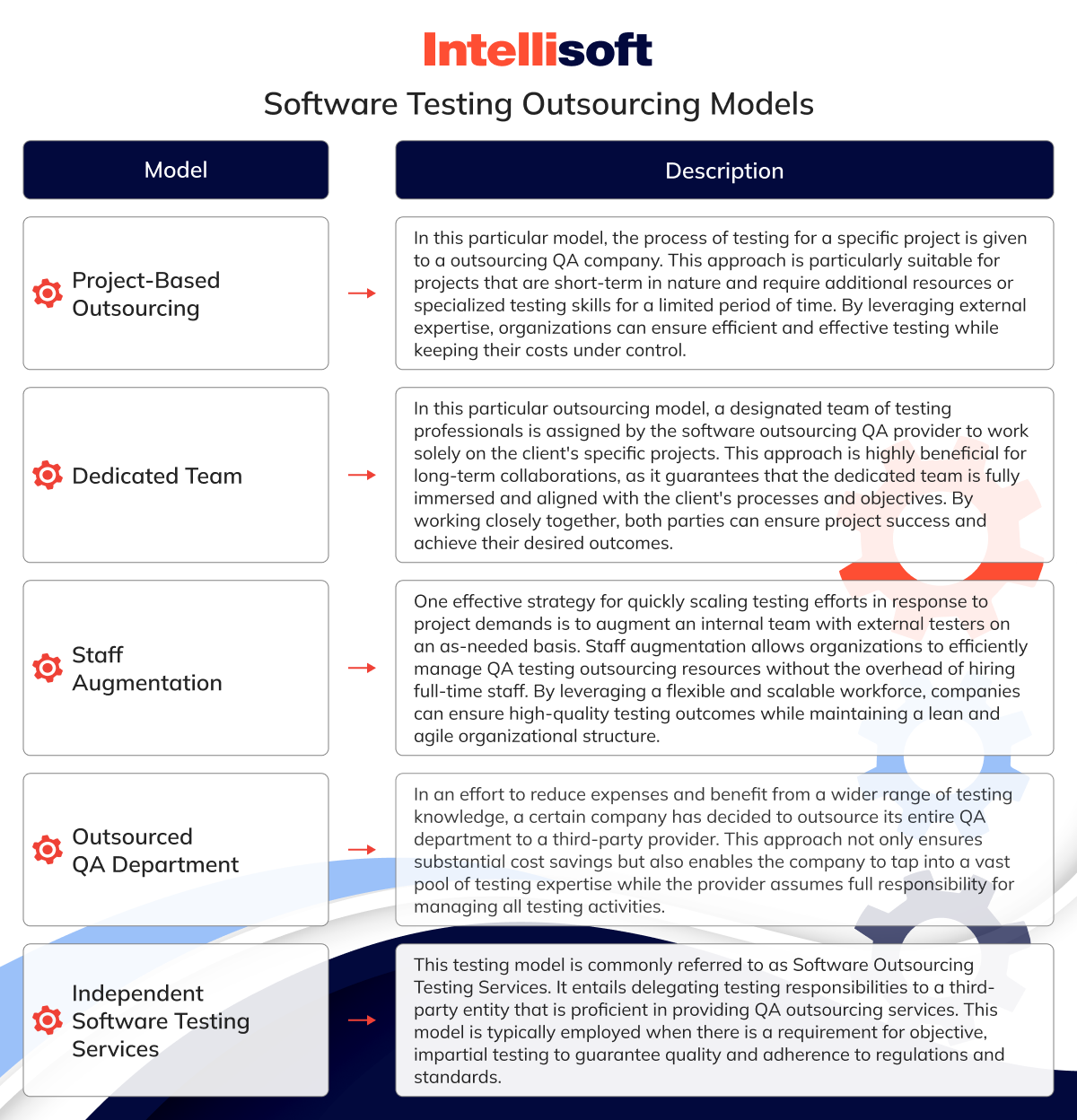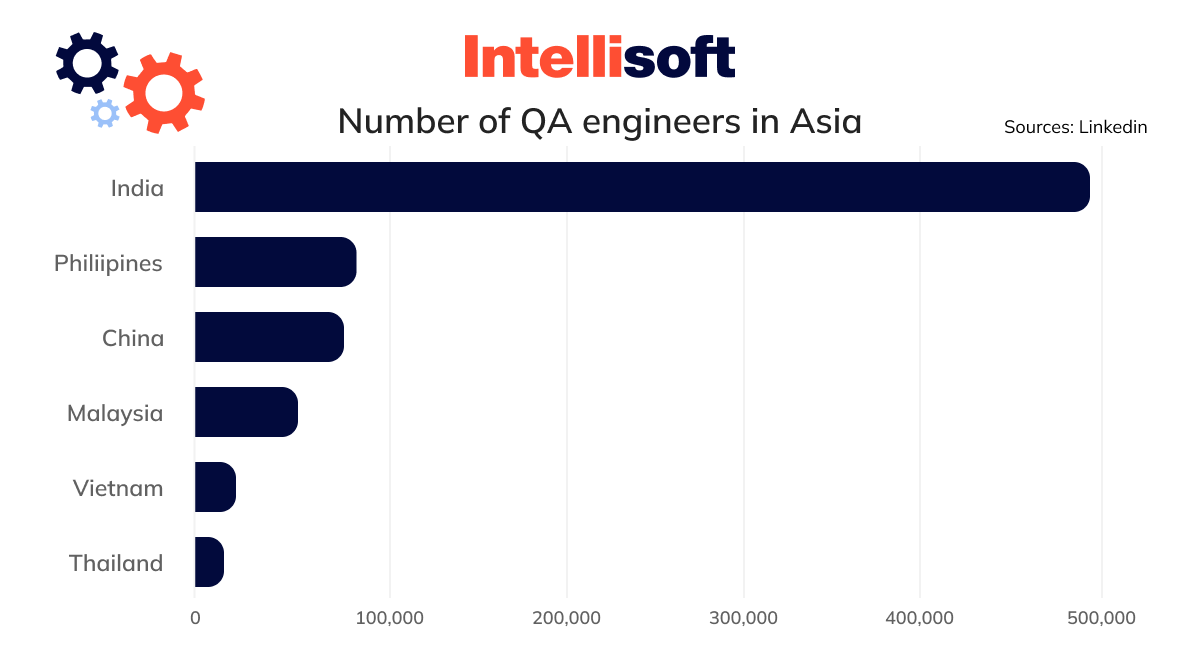Finding and hiring talented quality assurance (QA) analysts is challenging, especially if you are a new startup with limited financial resources. One of the main reasons for this is that the salaries of quality assurance analysts in the United States can be pretty high. According to Glassdoor, the average annual salary of a quality assurance analyst in New York City is $60,057, and they receive an additional $10,748 in cash compensation.
In case you’re facing a budget crunch while trying to maintain the quality of your startup’s products or services, there’s a practical solution that you might find useful. You could consider hiring quality assurance outsourcing teams from other countries. This approach can not only help you save significantly on costs, but also enable you to maintain the quality of your products and services. Many companies outsource their QA to countries such as Romania, Ukraine, India, and the Philippines, which are far from their home base. Let’s learn more about the concept and workings of QA outsourcing.
Table of Contents
What Is QA Outsourcing and How Does It Work?
Outsourcing refers to hiring an outside vendor to handle specific business functions, often non-core ones. These vendors can be located either nearshore or offshore. The global IT outsourcing market is projected to generate $460.10 billion by the end of 2023. Within this market, outsourcing QA accounts for a significant portion, valued at $36.4 billion in 2022.
Outsourcing quality assurance involves delegating some or all of the software testing or QA processes to an external vendor. The vendor offers a dedicated team of skilled testers who provide comprehensive quality assurance services for a predetermined duration, adhering to the specific testing requirements and scope as agreed upon. While the cooperation can be permanent, project-based collaboration is also a common option.
Outsourcing members for a project must follow the project requirements meticulously. This approach includes adhering to specific testing methodologies, tools, and other testing demands that have been established. Remember that the outsourced team is not an independent QA operation but an extension of the in-house QA team. The outsourced team provides additional workforce and often niche expertise that the in-house team may not possess, contributing to a more comprehensive and well-rounded approach to testing.
Quality Assurance Outsourcing Benefits
Outsourcing QA testing has several benefits, making it an excellent option for businesses. Here are some advantages of outsourcing software testing:

- Lower testing cost. Outsourcing your QA testing to foreign teams can offer several significant advantages. One of the most significant benefits is cost savings. Compared to in-house specialists, foreign QA teams frequently offer significantly lower rates without any overhead costs. This approach can make your QA testing outsourcing project far less expensive to build and maintain, allowing you to allocate those resources to other areas of your business.
- Seamless access to a diverse talent pool. By partnering with a QA outsourcing company, you can swiftly and confidently build a team of professionals with the necessary skills and knowledge to fill the gaps in your existing operations. Hiring in-house can be a long and complex process, often taking several months to complete. Additionally, finding niche specialists to join your team can be extremely challenging, as these professionals are not only rare but also in high demand. Therefore, outsourcing can prove to be a much more efficient and effective way to augment your workforce and meet your business needs.
- Faster time to market. By outsourcing a team for your software development, you can ensure that the development process is initiated efficiently and updates are provided in real time. This approach enables you to detect and resolve bugs quickly, resulting in a shorter release schedule. As a result, you don’t have to wait until testing is completed to fix issues, and your software development project is completed more efficiently.
- Unparalleled flexibility and scalability. One of the key advantages of QA outsourcing is the absolute control you have in assembling the team and managing your testing project. You dictate the team’s size and composition, the project’s scope and duration, and you can pause or resume work at your discretion. Furthermore, you can easily expand the project by adding new team members or downsizing if you need to reduce expenses.
- Easier management. When it comes to planning a small or medium-sized testing project, it can be challenging to manage an in-house team due to limited time and resources. This approach may result in gaps in testing, which can cause the project to take longer than expected. However, by partnering with a vendor, you can benefit from their management services, making the entire process more streamlined and efficient. With vendor management, you can ensure that your project deadlines are met and all testing requirements are fulfilled to the highest quality standards.
- High employment costs for an in-house team. If you have a one-time project and your in-house team responsible for quality assurance of your app or website lacks the necessary skills, then hiring QA outsourcing company can be a viable solution. By doing so, you can benefit from the services of qualified professionals who can either augment your existing team or create a new team dedicated to your project. In this way, you can avoid worrying about additional expenses such as taxes, vacations, or bonuses that you would have to provide to an in-house expert.
When to Outsource Quality Assurance?
Although outsourcing quality assurance has become common, not all businesses are well-versed in this service and its potential benefits. Consequently, some company owners see outsourcing as a panacea for all their software quality concerns, while others perceive it as a viable option only for specific, minor tasks. So, when is the most appropriate time to outsource your QA requirements? Here are some scenarios where outsourcing QA needs could be a practical choice.
Time-sensitive Tasks
If you’re running a software development project, you know how critical it is to test your software before it goes live. However, building an in-house team to handle testing can be time-consuming and costly. Finding the right people for the job can take weeks if not months. That’s where outsourcing comes in.
With software quality assurance outsourcing as a service, you can quickly and easily assemble a team of experienced testers who will hit the ground running. You can have a dedicated team working on your project in as little as ten days. Your outsourcing partner will work with you to determine the optimal team size and structure and will provide you with a selection of highly qualified candidates for each role. In this way, you can start testing quickly and efficiently, with the assurance that you have the right people for the job. You can save time, reduce costs, and achieve better results by outsourcing your testing needs.
Internal Team Is Missing the Required Skills
Software quality assurance (QA) is a critical software development process requiring much technical and industry expertise. However, not all companies have the resources or knowledge to carry out this process effectively. That’s where software QA outsourcing comes in. By outsourcing their QA needs to a specialized company, businesses can benefit from the knowledge and experience of professionals who deeply understand the latest testing methodologies and industry trends.
This approach enables companies to minimize knowledge gaps and carry out the testing process smoothly without interruptions. Moreover, cutting-edge techniques and technologies ensure that the software is high-quality, meets industry standards, and satisfies customer needs.
Resource-intensive, Long-term Project
When it comes to long-term and comprehensive testing projects, outsourcing QA can be an effective cost-saving measure. Hiring many QA experts on a full-time and continuous basis can be a significant expense that can be challenging for small and medium-sized businesses to manage. QA outsourcing services can provide various benefits to companies, including significantly lower rates compared to local hiring.
This approach allows organizations to run long-term testing projects without burning a hole in their pockets while maintaining the quality of work. Consequently, companies can save a considerable amount of money, which can be invested in other business areas. Moreover, outsourcing QA services can bring in fresh perspectives and expertise, leading to better testing outcomes and reliable software products.
Small or Temporary Project
If you are working on a small software project or need to focus on a specific area of testing, such as security or regression testing, making permanent hiring decisions may not be feasible. This is because you may not have a steady stream of tasks to assign to new team members over an extended time. In such cases, quality assurance outsourcing can be an excellent solution, as it provides you with the flexibility and agility you need.
You can pause, continue, end, or expand your collaboration with the outsourcing vendor based on your project’s evolving requirements. This approach allows you to adjust the scope and scale of your testing efforts as needed without being constrained by fixed hiring commitments.
What Is the Process of QA Outsourcing?
Outsourcing Quality Assurance (QA) is a meticulous process that involves multiple crucial steps to ensure that software testing is carried out with maximum efficacy and proficiency by an external vendor. The process typically encompasses various stages, including but not limited to:

- Identification of QA Needs. It is important to understand the specific requirements for QA, including the necessary scope of testing, timelines, and technical expertise.
- Vendor Selection. Choosing the right quality assurance outsourcing partner is crucial for the project’s success and should be based on factors like expertise, reputation, and alignment with project needs.
- Onboarding and Integration. Introduce the QA team to the project’s objectives, tools, and processes by setting up communication channels and integrating the team with existing workflows.
- Test Planning and Strategy Development. Creating a comprehensive testing plan that specifies testing methods, tools, and schedules.
- Execution of Testing. Outsourcing QA testing activities may include functional, usability, and performance testing, depending on project requirements.
- Reporting and Feedback. Reporting testing results, discussing findings, and recommending improvements to the development team.
- Continuous Improvement. By refining the testing process iteratively based on feedback and project needs, we can ensure optimal QA outcomes.
What are Software Testing Outsourcing Models?
Software testing outsourcing models are well-defined strategies that involve the engagement of quality assurance outsourcing companies for managing different aspects of software testing. These models are specifically crafted to ensure the efficient utilization of resources, minimize costs, improve testing quality, and leverage the expertise of specialized professionals. The various models that are widely recognized in the industry include:

Project-Based Outsourcing
In this particular model, the process of testing for a specific project is given to a outsourcing QA company. This approach is particularly suitable for projects that are short-term in nature and require additional resources or specialized testing skills for a limited period of time. By leveraging external expertise, organizations can ensure efficient and effective testing while keeping their costs under control.
Dedicated Team
In this particular outsourcing model, a designated team of testing professionals is assigned by the software outsourcing QA provider to work solely on the client’s specific projects. This approach is highly beneficial for long-term collaborations, as it guarantees that the dedicated team is fully immersed and aligned with the client’s processes and objectives. By working closely together, both parties can ensure project success and achieve their desired outcomes.
Staff Augmentation
One effective strategy for quickly scaling testing efforts in response to project demands is to augment an internal team with external testers on an as-needed basis. Staff augmentation allows organizations to efficiently manage QA testing outsourcing resources without the overhead of hiring full-time staff. By leveraging a flexible and scalable workforce, companies can ensure high-quality testing outcomes while maintaining a lean and agile organizational structure.
Outsourced QA Department
In an effort to reduce expenses and benefit from a wider range of testing knowledge, a certain company has decided to outsource its entire QA department to a third-party provider. This approach not only ensures substantial cost savings, but also enables the company to tap into a vast pool of testing expertise while the provider assumes full responsibility for managing all testing activities.
Independent Software Testing Services
This testing model is commonly referred to as Software Outsourcing Testing Services. It entails delegating testing responsibilities to a third-party entity that is proficient in providing QA outsourcing services. This model is typically employed when there is a requirement for objective, impartial testing to guarantee quality and adherence to regulations and standards.
Typical Composition of an Outsourced QA Team: QA Engineer and Other Roles
Software quality assurance project outsourcing entails assembling a well-equipped team to tackle the project requirements. The composition of this team is dependent on several factors, such as the size and complexity of the project, the specific testing requirements, and the existing in-house team. It is important to note that the team’s composition may change throughout the project lifecycle to ensure that testing efforts are optimized during different development stages or to carry out specialized testing such as security or penetration testing. Despite the variations, specific roles are typically present in most outsourced QA projects. These roles are essential to ensure the project is executed efficiently and effectively.

QA Engineer
The role of a QA Engineer is pivotal in any testing project. They are responsible for conducting comprehensive and meticulous software testing to identify and report any bugs or glitches. Additionally, they ensure that the software performs optimally in different environments and meets the required performance standards.
Test Lead
A Test Lead is a crucial member of the QA team who creates a testing plan and oversees the project from start to finish. They monitor progress, identify issues, and work with the development team to resolve bugs and defects as needed.
Automation QA
With the advancement of technology, automated testing has become a crucial aspect of quality assurance projects. An Automation QA specialist is responsible for analyzing the testing process to identify areas that can be automated, selecting the most suitable automation tools, and then automating the required tests. This approach saves time and effort and ensures the testing process is more reliable and accurate.
Domain Expert
It is essential to have a domain expert on the development team to ensure that software products created for highly specialized industries such as telemedicine or fintech are tailored to meet the specific needs of their users. This individual possesses the in-depth knowledge and expertise required to identify the most important tasks and ensure that no critical aspects are overlooked during development.
Test Environment Manager
A suitable environment, including hardware, software, network, and other parameters, is crucial for effectively managing testing. A test environment manager is responsible for maintaining and managing this environment and ensuring that all infrastructure-related matters, such as configuration, setup, maintenance, and troubleshooting, are taken care of efficiently.
Test Documentation Specialist
Effective communication is a crucial aspect of any successful project. When collaborating with an external Quality Assurance (QA) department, proper documentation is the project’s backbone, providing a comprehensive understanding of current affairs. It also facilitates the rapid onboarding of new team members by allowing them to familiarize themselves with the process and the project’s history. A Test Documentation Specialist plays a crucial role in ensuring that all relevant documentation is created, updated, and transferred correctly, thus ensuring a smooth and efficient workflow.
Test Coordinator
The role of a Test Coordinator is typically assigned to manage large-scale testing projects that involve multiple participants working from different locations. The Test Coordinator is crucial in facilitating effective communication between all departments and stakeholders involved in the project, ensuring everyone is on the same page and working towards the same goals. The testing process is coordinated and overseen from start to finish to ensure all objectives are met within the set timeline and budget.
Related articles:
- Cracking the Code: How to Write a Bug Report That Developers Love
- QA, QC, and Testing: The Three Pillars of Software Quality Management
- What Is Software Testing and When Your Product Needs It?
- Today’s World’s Most Popular Tools for Testing REST API
- Best Testing Automation Tools: Today’s Most Popular Solutions for Examining Apps
How to Choose the Best Location for Outsourced Offshore QA
When companies need to hire a Quality Assurance team to work remotely, they often consider three main regions as their potential options: Asia, South America, and Eastern Europe. To make a well-informed decision, it is crucial to conduct a detailed analysis of each location and carefully evaluate their respective advantages and disadvantages.
Asia

Asia has been a preferred destination for software QA outsourcing for a long time. Every year, Indian engineering institutes produce 1.5 million engineering graduates and over 200,000 IT graduates join the IT workforce annually, making India home to the world’s youngest employable population in the field.
Experts from this region are known for their high expertise in providing outsource quality assurance services. Countries such as India and Vietnam often feature in the lists of countries with the best engineers. For instance, TopCoder ranks India 1st in the world.
Establishing effective communication with an offshore QA team in certain regions can be daunting for many businesses, particularly those from Western countries. This is because the low-quality internet infrastructure prevalent in the local countries can pose significant challenges. Besides, the cultural and work ethic differences between the regions can often make it difficult to find common ground, worsening the communication gap.
South America

Mexico and South America are among the most sought-after destinations for quality assurance outsourcing, particularly in the United States. Although this region is smaller than Asia, it still boasts a commendable pool of quality assurance experts. Countries such as Argentina, Mexico, and Brazil have several skilled QA engineers. However, they are usually ranked slightly lower than their Asian or Eastern European counterparts in terms of skills and expertise. According to TopCoder, Brazil has the most skilled experts in the region and ranks 11th globally.
However, establishing effective communication and long-term cooperation with local offshore outsourced QA teams in this region can be challenging. Many of these countries have low English proficiency and are plagued by various forms of political or economic instability. These factors can have unpredictable effects and bring a sense of uncertainty to the partnerships built with QA outsourcing companies.
Eastern Europe

Offshore QA testing is a practice that has been gaining popularity over the years, and Eastern Europe is one of the most sought-after destinations for this service. The region boasts of several countries that have a well-established reputation for having some of the most skilled and knowledgeable experts in the industry. According to TopCoder, engineers from Poland and Ukraine rank at number 16 and number 17 on the list of the best professionals in the world. This is a clear indication of the high-quality standards that are maintained in the region’s tech industry.
What are QA Outsourcing Specialists’ Hourly Rates by Country?
The salary range for a QA tester can vary significantly depending on the location. If you’re searching for a QA tester, you may find suitable candidates in countries such as the USA, Western Europe, India, Ukraine, or other Eastern European countries. However, keep in mind that the hourly rates can vary considerably based on several factors, such as market development, competition, and the availability of experienced quality assurance outsourcing companies in each country or region. Therefore, conducting thorough research and analysis before hiring a QA tester is crucial to ensure you get the best value for your money.

North America
The hourly rates for QA outsourcing services in North America can vary significantly depending on the level of expertise of the tester and the complexity of the testing required. Typically, the rates fall between $50 and $150 per hour.
Western Europe
Hourly rates for professional services can vary significantly, typically from $40 to $100. The factors that contribute to this variance include the level of expertise required for the job, the project’s complexity, and the client’s specific needs.
Eastern Europe
This region is renowned for its competitive rates, which fall between $25 and $50 per hour. The people of Eastern Europe are known for their exceptional technical education and remarkable command of the English language, making them an excellent choice for a wide range of services.
Asia
This region is known for offering some of the most competitive rates for outsource quality assurance services, with hourly rates ranging from as low as $10 to $30. One key reason for its popularity as a software QA outsourcing destination is the abundance of talented professionals available at lower costs.
Latin America
In Latin America, the hourly rates for various services can fluctuate significantly, ranging from $20 to $50. The region has been increasingly attractive to businesses in recent years due to its rapidly expanding tech industry and favorable time zone proximity to the United States. This approach makes Latin America a highly desirable location for outsourcing.
How to Find a Trustworthy Outsourcing Quality Assurance Provider
Finding a software outsourcing company may seem overwhelming at first. However, with a little bit of research, it can turn out to be a less daunting process. A reliable outsourcing team can bring a lot of value to your business. To ensure that you select the right team for your needs, there are some key features that you should look for.
Proven Proficiency in Automated Testing Tools and Methodologies
The landscape of automated testing tools is vast, with several options tailored to different testing needs and methodologies. Some of the best tools and the methodologies they support include:
Tools:
- Selenium. Selenium is an open-source tool for web application testing across different platforms and browsers, making it highly versatile and widely recognized.
- Katalon Studio. This comprehensive tool has a user-friendly interface for automated APIs and web, mobile, and desktop application testing.
- TestComplete. It helps create automated tests for mobile, web, and desktop applications with minimal coding knowledge.
- Cypress. This software has gained popularity for web app testing with real-time reloads and debugging.
- Appium. Appium is an open-source tool for automating mobile applications on iOS and Android, including native, hybrid, and web apps.
Methodologies:
- Behavior-Driven Development (BDD). Tools like Cucumber support Behavior-Driven Development (BDD) testing by creating simple scenarios that describe how an application should behave from an end-user’s perspective.
- Data-Driven Testing. This approach involves validating all paths of a feature by running tests with different inputs. Selenium can be used for data-driven tests.
- Keyword-Driven Testing. TestComplete and Katalon Studio support the keyword-driven testing methodology, which utilizes predefined keywords to define test cases.
- Continuous Integration/Continuous Deployment (CI/CD). This approach involves incorporating automated testing into every software development life cycle stage to ensure high quality. Jenkins is a widely used tool for CI/CD processes.
Solid Experience with Continuous Integration (CI) and Continuous Deployment (CD)
Continuous Integration (CI) and Continuous Deployment (CD) have emerged as the industry-standard best practices. These methodologies have enabled fully leveraging the potential of automated testing. By combining CI and CD tools, developers can quickly identify code defects and ensure their code is more reliable. This process greatly accelerates the development cycle and minimizes the time to market your products. Hence, your development partner must have a thorough understanding of how to implement automated testing in CI and CD so that you can take full advantage of its benefits.
Flexible Approach to the Choice of Tools and Practices
It is vital to ensure that your technology partner is flexible and capable enough to tailor their testing procedures to meet all your requirements. In addition to providing their preferred technologies, QA outsourcing companies must be prepared to offer and adopt alternative technologies if they are better suited for your project needs. This adaptability is crucial to ensure a successful partnership and achieve optimal results.
Conclusion
The process of outsourcing quality assurance is not a simple task. It requires ample research and personal interactions to ensure that the chosen partner perfectly matches your objectives. This is where IntelliSoft comes in, offering a comprehensive solution to your outsourcing needs.
At IntelliSoft, we believe that software outsourcing QA is not just about accomplishing tasks; it’s about building long-lasting relationships based on trust, quality, and a shared commitment to mutual success. We go beyond mere reliability and offer transparent communication, rigorous security measures, and a flexible approach tailored to each client’s unique requirements. Contact us to get service that surpasses expectations and delivers outstanding results.









